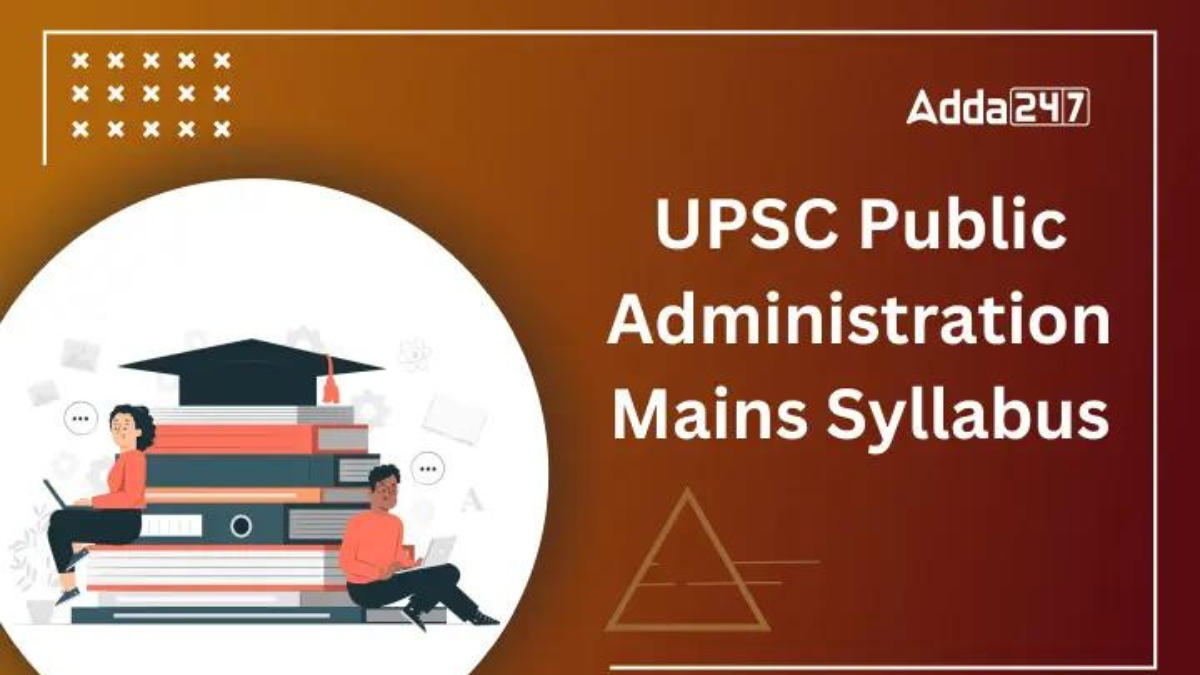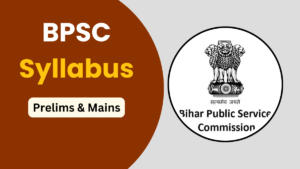Table of Contents
The UPSC Public Administration Syllabus 2024 offers candidates an in-depth understanding of government operations, policy-making, organizational management, and ethical considerations. This optional subject, known for its relevance and direct applicability, attracts a large number of aspirants each year. It is considered among the top 10 challenging subjects in the UPSC exam due to its broad scope and conceptual depth.
The syllabus for Public Administration is divided into two papers: Paper I and Paper II, each covering essential areas of public administration theory and its application in India. This optional is part of the UPSC Mains Examination, which includes a total of nine papers. Here’s a detailed breakdown of the Public Administration syllabus to help you prepare efficiently.
UPSC Public Administration Syllabus 2024
The UPSC Public Administration Syllabus is a popular optional for those interested in government operations and public management. This subject, part of the UPSC Mains, lets candidates attempt five out of eight questions, with one compulsory from the last three. Well-prepared aspirants can access top Public Administration books to excel in this subject, which can significantly enhance their overall UPSC score.
| Aspect | Details |
|---|---|
| Total Papers | 2 Paper |
| Marks per Paper | 250 Marks each |
| Total Marks | 500 Marks |
| Impact on Overall Score | A strong performance in Public Administration can significantly boost the overall score in the UPSC Mains exam |
Public Administration Syllabus For Optional Paper I
Candidates can check the topic-wise UPSC Public Administration Syllabus for Mains Optional Paper I. The syllabus covers administrative theory, organizational behavior, accountability, administrative law, development administration, and comparative public administration. Understanding each topic thoroughly ensures a comprehensive preparation strategy and helps in writing well-structured exam answers.
Administrative Theory
- Introduction: Meaning, scope, and significance of Public Administration syllabus; Wilson’s vision of Public Administration; Evolution of the discipline and its present status; New Public Administration; Public Choice approach; Challenges of liberalization, Privatisation, Globalisation; Good Governance: concept and application; New Public Management.
- Administrative Thought: Scientific Management and Scientific Management movement; Classical Theory; Weber’s bureaucratic model – its critique and post-Weberian Developments; Dynamic Administration (Mary Parker Follett); Human Relations School (Elton Mayo and others); Functions of the Executive (C.I. Barnard); Simon’s decision-making theory; Participative Management (R. Likert, C.Argyris, D.McGregor).
- Administrative Behaviour: Process and techniques of decision-making; Communication; Morale; Motivation Theories – content, process and contemporary; Theories of Leadership: Traditional and Modern.
- Organisations: Theories – systems, contingency; Structure and forms: Ministries and Departments, Corporations, Companies, Boards and Commissions; Ad hoc and advisory bodies; Headquarters and Field relationships; Regulatory Authorities; Public – Private Partnerships.
- Accountability and control: Concepts of accountability and control; Legislative, Executive, and Judicial control over administration; Citizen and Administration; Role of media, interest groups, voluntary organizations; Civil society; Citizen’s Charters; Right to Information; Social audit.
- Administrative Law: Meaning, scope, and significance; Dicey on Administrative law; Delegated legislation; Administrative Tribunals.
- Comparative Public Administration: Historical and sociological factors affecting administrative systems; Administration and politics in different countries; Current status of Comparative Public Administration; Ecology and administration; Riggsian models and their critique.
- Development Dynamics: Concept of development; Changing profile of development administration; ‘Anti-development thesis’; Bureaucracy and development; Strong state versus the market debate; Impact of liberalization on administration in developing countries; Women and development – the self-help group movement.
- Personnel Administration: Importance of human resource development; Recruitment, training, career advancement, position classification, discipline, performance appraisal, promotion, pay and service conditions; employer-employee relations, grievance redressal mechanism; Code of conduct; Administrative ethics.
- Public Policy: Models of policy-making and their critique; Processes of conceptualization, planning, implementation, monitoring, evaluation, and review and their limitations; State theories and public policy formulation.
- Techniques of Administrative Improvement: Organisation and methods, Work study and work management; e-governance and information technology; Management aid tools like network analysis, MIS, PERT, and CPM.
- Financial Administration: Monetary and fiscal policies; Public borrowings and public debt Budgets – types and forms; Budgetary process; Financial accountability; Accounts and audit.
Public Administration Syllabus For Optional Paper II
Candidates can check out the Topic-wise UPSC Public Administration Syllabus for Mains Optional Paper II.
Indian Administration
- Evolution of Indian Administration: Kautilya’s Arthashastra; Mughal administration; Legacy of British rule in politics and administration – Indianization of public services, revenue administration, district administration, local self-government.
- Philosophical and Constitutional framework of government: Salient features and value premises; Constitutionalism; Political culture; Bureaucracy and democracy; Bureaucracy and development.
- Public Sector Undertakings: Public sector in modern India; Forms of Public Sector Undertakings; Problems of autonomy, accountability, and control; Impact of liberalization and privatization.
- Union Government and Administration: Executive, Parliament, Judiciary – structure, functions, work processes; Recent trends; Intragovernmental relations; Cabinet Secretariat; Prime Minister’s Office; Central Secretariat; Ministries and Departments; Boards; Commissions; Attached offices; Field organizations.
- Plans and Priorities: Machinery of planning; Role, composition, and functions of the Planning Commission and the National Development Council; ‘Indicative’ planning; Process of plan formulation at Union and State levels; Constitutional Amendments (1992) and decentralized planning for economic development and social justice.
- State Government and Administration: Union-State administrative, legislative, and financial relations; Role of the Finance Commission; Governor; Chief Minister; Council of Ministers; Chief Secretary; State Secretariat; Directorates.
- District Administration since Independence: The changing role of the Collector; Union-state-local relations; Imperatives of Development Management and Law and Order Administration; District Administration and democratic decentralization.
- Civil Services: Constitutional position; Structure, recruitment, training, and capacity-building; Good governance initiatives; Code of conduct and discipline; Staff associations; Political rights; Grievance redressal mechanism; Civil service neutrality; Civil service activism.
- Financial Management: Budget as a political instrument; Parliamentary control of public expenditure; Role of finance ministry in the monetary and fiscal area; Accounting techniques; Audit; Role of Controller General of Accounts and Comptroller and Auditor General of India.
- Administrative Reforms since Independence: Major concerns; Important Committees and Commissions; Reforms in financial management and human resource development; Problems of implementation.
- Rural Development: Institutions and agencies since independence; Rural development programs: foci and strategies; Decentralization and Panchayati Raj; 73rd Constitutional amendment.
- Urban Local Government: Municipal governance: main features, structures, finance, and problem areas; 74th Constitutional Amendment; Global-local debate; New localism; Development dynamics, politics, and administration with special reference to city management.
- Law and Order Administration: British Legacy; National Police Commission; Investigative agencies; Role of central and state agencies including paramilitary forces in maintenance of law and order and countering insurgency and terrorism; Criminalisation of politics and administration; Police-public relations; Reforms in Police.
- Significant issues in Indian Administration: Values in public service; Regulatory Commissions; National Human Rights Commission; Problems of administration in coalition regimes; Citizen-administration interface; Corruption and administration; Disaster management.
UPSC Public Administration Syllabus 2024 Download PDF
Candidates who are appearing for the UPSC Public Administration mains Exam can download the UPSC Public Administration Syllabus PDF Here. Click on the link below to Download the UPSC Public Administration Syllabus 2024.
Download UPSC Public Administration Syllabus 2024 PDF
Public Administration Optional Subjects Books
| Title | Author |
|---|---|
| Public Administration | Laxmikanth |
| New Horizons of Public Administration | Mohit Bhattacharya |
| Indian Administration | S.R. Maheshwari |
| Public Policy: Concepts, Theories, and Applications | Rumki Basu |
| Administrative Thinkers | Prasad and Prasad |
| Public Administration: Concepts and Theories | Basu Rumki |
| Public Administration and Public Affairs (12th Edition) | Nicholas Henry |
| Contemporary Debates in Public Administration | Dhameja Alka |
| Introduction to the Constitution of India | D.D. Basu |
| Administrative Theories And Management Thought | Sapru |
Preparation Tips for Public Administration Optional Subject
Preparing for the UPSC optional Public Administration subject requires a focused and systematic approach. The top priority should be thoroughly understanding the fundamentals.
Regardless of your background, approach the subject as a dedicated student of public administration. Use administrative terms, think about issues from an administrative perspective, and provide well-organized answers to improve your exam performance.
| Sr. No. | Strategy | Details |
|---|---|---|
| 1 | Thorough Understanding of Basics |
|
| 2 | Create Concise Notes |
|
| 3 | Consistent Study Routine |
|
| 4 | Remember Quotes from Thinkers |
|
| 5 | Answer Writing Practice and Test Series |
|
| 6 | Learn from Previous Year’s Questions |
|
| 7 | Approach Like a Pub Ad Student |
|
UPSC Optional Syllabus
| UPSC Optional Subject Syllabus | |
| UPSC History Syllabus | UPSC Maths Syllabus |
| UPSC Geography Syllabus | UPSC Physics Syllabus |
| UPSC Botany Syllabus | UPSC Zoology Syllabus |



 APSC Syllabus 2025, Download Prelims And...
APSC Syllabus 2025, Download Prelims And...
 Punjab PCS Syllabus 2025, New Prelims an...
Punjab PCS Syllabus 2025, New Prelims an...
 BPSC Syllabus 2025 and Exam Pattern For ...
BPSC Syllabus 2025 and Exam Pattern For ...
